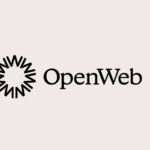OpenWeb’s core mission is to create a healthier internet that is mutually beneficial for publishers, brands and – of course – users.
This mission is not one we can go at alone. That’s why we have partnered with organizations that are on complementary missions to fight misinformation online and uphold journalistic standards, such as NewsGuard.
Recently, OpenWeb’s Manager of Trust and Safety, Matt Rahm, and NewsGuard’s VP Strategic Partnerships, Veena McCoole, had a chance to catch up with us on our critical partnership. Read on for the full Q&A.
Give us a bit of background on the partnership — how did you start working together? What are some of the shared values that made the partnership interesting to both companies?
Matt Rahm, OpenWeb: Our mission at OpenWeb has always been to save online conversations and create a healthier, more social web. To do that, we needed to look at the whole picture: both the quality of conversations users have and the quality of content from publishers across our network. So, we sought to find partners that would help us safeguard against misinformation, toxicity, and other lax journalistic standards. While we work with several expert partners to achieve this, NewsGuard is an indispensable part of upholding our Publisher Standards. NewsGuard acts as a third-party partner with deep expertise on these issues; an incredibly valuable resource to support our mission.
Veena McCoole, NewsGuard: We’re committed to fighting misinformation using trained journalists, and in doing so, helping companies like OpenWeb make informed decisions about which companies to partner with based on their publisher standards. OpenWeb proactively approached us to collaborate before many tech companies were thinking about mis- and disinformation, which shows that addressing misinformation was a priority for them to address, particularly in the realm of creating a healthy environment for users. NewsGuard’s source reliability ratings, which are produced by trained journalists, are a crucial input into the brand safety policies and practices of technology companies like OpenWeb. Our apolitical criteria of transparency and credibility set basic standards of trustworthiness that platforms like OpenWeb can leverage to ensure that they partner with news and information websites that meet their user and brand safety standards for trustworthiness and quality.
While the companies come at the issue in a slightly different way, you’re both passionate about making the internet a better place by fighting misinformation and other forms of toxicity. Why do you see this goal as a business imperative?
OpenWeb: Toxicity, whether from a user or a content creator, has created an environment that’s unsafe for people, for advertisers, and for society. While that may sound grand, we’re not alone in identifying the massive scope of the impact of online toxicity. For instance, even former President Barack Obama cited misinformation and online toxicity as integral to increasing polarization and a threat to democracy in a recent speech on the matter. With stakes so high, this is more than a business imperative—and it is essential to our mission to create a safer, healthier web rooted in high-quality conversations. Equally essential is our ability to uphold a higher degree of rigor for curbing toxicity among publishers. With NewsGuard’s support, and the support of other expert partners, we can get closer to bringing our vision to life.
NewsGuard: Serious reputational damage can be done if companies are associated with websites that have been found to systematically spread hoaxes and harmful misinformation, so it’s crucial that companies are fully aware of the journalistic and ethical practices of the websites with which they partner. Quality journalism is essential for democracy and expensive to produce, and NewsGuard’s ratings help brands ensure the news sources they partner with or advertise on practice reliable reporting. But partnering with reliable news sources isn’t just a good thing for society: It’s also good for a company’s bottom line. For example, in the context of advertising, research we’ve conducted with various ad agency partners shows that when advertisers target their campaigns to include trusted news sources, their costs go down and the performance of their campaigns go up.
How has the evolution of misinformation over the past few years made this partnership so important to the publishing industry? Why should the general public care about things like trust scores?
OpenWeb: We believe that healthy conversations start with content that meets certain standards of integrity. NewsGuard’s expertise is in exactly that—and their work is essential to creating a healthier web.
NewsGuard: Misinformation is a nuanced and evolving threat that has raced up the corporate, social and political agenda in recent years, catalyzed by global events like COVID-19 and the Russia-Ukraine war, which have raised the stakes for harmful misinformation. As such, OpenWeb and other early adopters of NewsGuard have benefitted from the first-mover advantage of championing responsible news in their work and for their clients. The public, more than ever before, holds companies to increasingly high standards of accountability for their actions. If companies are seen to disregard the threats of misinformation, customers will notice and loyalty will suffer. We can only imagine this issue will continue to grow in complexity and nuance, and we are proud to support our partners who prioritize fighting against misinformation and supporting trustworthy journalism.
What are some of the biggest wins you’ve seen in the fight against misinformation and toxicity online?
OpenWeb: Today, we are finally seeing recognition and action from technology companies to combat misinformation and toxicity. We see this in the proliferation of safety and trust teams at virtually every major platform, enhanced user reporting tools, greater participation from civil society, investment and advances in AI and Machine Learning to pre-empt unsafe content, the development of industry and academic groups searching for solutions, and other proactive measures across the industry, to name a few. While we have a long way to go, it’s safe to say that we are finally getting on the path.
NewsGuard: A huge win for publishers, brand safety providers, end users, and society as a whole has been the recognition that to combat misinformation, we need to deploy multiple solutions that approach the problem in different ways. Fact-checking alone won’t stop the spread of new misinformation, and blocking content is often not a sustainable approach, either. Rather, when platforms take responsibility for content by empowering users with the tools and context they need to make informed decisions about what to trust and share, integrating various front-end and back-end technologies that collectively mitigate the effects of misinformation, everyone wins.
What is your hope for the future of how we consume and interact with news?
OpenWeb: Today, readers often get their news from the social media platforms that have grown to occupy a majority of user time and attention online. These platforms have become, as Elon Musk recently said of Twitter, “the de facto public town square.” However, these platforms have too often allowed toxicity to flourish. To create a healthier, more social, and more open internet we need to find new ways to empower readers to reduce their reliance on these platforms. We believe that building such a future relies on publishers having direct relationships with readers, building strong communities that keep readers coming back. Trust is essential to this equation—and that is why organizations like NewsGuard are so integral to upholding standards that form the backbone of a healthier web.
NewsGuard: Our hope is for a future in which news consumers can more confidently navigate the internet and equip themselves with the necessary context to make informed decisions about which news sources to trust and share with others. A sustainable, educational, and healthy approach to making sense of the world requires access to a multitude of credible sources from different perspectives. NewsGuard aims to foster an environment in which all online news sources adhere to journalistic standards of credibility and transparency, but until then, we encourage publishers to game our system by raising their standards of journalistic integrity for the benefit of all.


